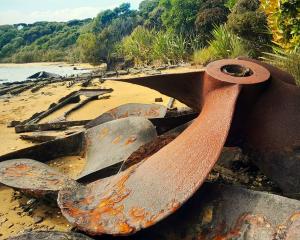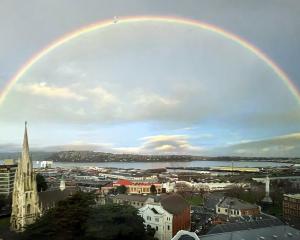Of all the thousands of whales Roger Payne has encountered, he has a special place for a female right whale he knows as Troff.
Payne has spent countless hours on a windswept clifftop in southern Argentina, high above the settled animal lying placidly in the southern Atlantic swell, rising and falling as the sea rolls over her. You do not tire, says Payne, of such a sight. The biologist even confesses to an affection for the elderly whale, mother to many calves.
But Troff has not returned the feeling. Forty years ago the American scientist paddled quietly up to the leviathan, unintentionally giving her the shock of her life. Startled, she fled in a panic, noisily protesting at the intrusion.
The great creature is still around, her identity confirmed by unique markings on her head called callosities. Payne's conservation and research group, Ocean Alliance, has catalogued more than 2300 of the endangered Patagonian right whales - singular individuals all bearing their own stamp.
Some of the females have been around long enough to qualify for a pension. In their migratory lifetimes they have travelled the equivalent of seven or more times around the world, consumed thousands of tonnes of food and produced thousands of litres of milk to raise hungry offspring.
As he approaches 78, Payne retains the same grand passion for whales that led in 1967 to his discovery that male humpbacks sing. In Auckland, where he is spending the summer with his actor wife Lisa Harrow, Payne recalls the moment when he first listened through headphones to whalesong.
He was on a research boat near Bermuda with a US Navy engineer who had recorded ocean sounds.
''I was down in the engine room and the noise was overwhelming. The guy gave me some earphones and said `listen to this' ... sounds he had recorded and thought, correctly as it turned out, came from humpback whales.
''It was the most astonishing, extraordinary thing I'd ever heard in the wild. It still remains that way.''
Payne borrowed a copy, analysed the sound with colleague Scott McVay, and published the findings in the journal Science.
A ''lousy, but enthusiastic amateur cellist'', Payne had enough of the musician in him to know the sounds he heard could stir human feelings.
''The thing that made it exciting was that the sound was utterly beautiful. A lot of people react by weeping. I don't, but others do. The sounds have an extremely emotional impact.''
For a few years in the early '70s, the sonic arrangements of humpbacks got a lot of airplay. Whales were hip. Payne produced three albums of humpback songs.
Folksinger Judy Collins sang over a layer of whalesong while Crosby, Stills, Nash and Young protested against their open slaughter. National Geographic issued whale sounds on vinyl and sold 10 million copies. Even Nasa got in on the act, pressing a disc from gold which included 55 human languages and the sound of one whale. The LP is hurtling into the cosmos on board the Voyager spacecraft.
BY 1986, with whales dug in as stars of the conservation movement, the International Whaling Commission declared an end to commercial hunting. Except, as Payne notes with undisguised anger, the killing hasn't stopped.
About 2000 whales are killed each year by crews from countries that either work around the ban, or just ignore it. Iceland and Norway hunt 600 between them.
Native hunters collect 350 for subsistence. Japan - pursued into Antarctic waters by the conservation group Sea Shepherd - has resumed its annual ''scientific'' hunt for 1000 whales, shot with harpoons, dragged drowning behind catcher vessels and jabbed with electrodes.
The methods disgust Payne: ''If you killed cows that way you'd be in jail before you could catch your breath''.
''Yet this industry is based on doing these vile things. You'd have to really work at it to find a more horrible way of killing.
''The entire `scientific' programme just appals me. It's commercial whaling under a different name. They call it scientific whaling. I can say that as a scientist I am utterly offended by it. It's a lie, and a rather boring lie.''
For the past decade, Ocean Alliance has studied the quality of the seas themselves. From its New Zealand-built steel-hulled ketch Odyssey, the group has collected samples from 955 sperm whales which, sitting at the top of the food chain, absorb organic pollutants and metals.
The most disturbing finding was high levels of chromium in all 955 whales, with those living near Kiribati in the central Pacific having the highest chromium concentrations.
''That was a complete shocker,'' Payne observed.
''Here we are, with samples from whales living about as far from any big agricultural or industrial sources as you could get and they had concentrations as high as humans who have died of lung cancer after working 20 years in chromium plants.''
He is uncertain how the whales absorbed the chemical but suspects the source may be toxic dumpsites left over from World War 2.
''Unless we can do something to reduce the entry of pollutants to the sea there's basically no hope for a lot of ocean life.''
More distressing research by the Ocean Alliance is due to emerge from samples collected from whales exposed to dispersants used to break up the catastrophic BP oil spill in the Gulf of Mexico. Payne suspects that the results will not be good news for whales.
The implications for the planet rest on the fact that a billion people rely on seafood for most of their protein. Whales, as an indicator species, offer us clues to the health of the seas. If the big animals are being slowly poisoned by unnatural levels of contaminants, their DNA disrupted by pollutants that are passed to offspring by nursing mothers, then humans too are at risk.
Payne's Ocean Alliance is doing its bit to make the future better for whales - and the rest of us. It has teamed up with John Warner, co-founder of ''green chemistry''. The aim is to create products which do the job of existing chemicals but don't end up in the food chain killing the ocean life on which humans and the rest of life on Earth are dependent.
''Think of it this way: If you produce chemicals that cost more to transport and store and discard; that incur greater security costs, and cause you to hire more and more lawyers to defend your corporation against fines and class action suits, all of which might damage your reputation in the long run and affect your ability to hire the best and the brightest, you'd be crazy not to consider benign chemical alternatives. Industries would welcome such alternatives - it's just that they need to make inventing them their top priority, and that is what we are promoting with John Warner.''
With Harrow, Payne is a not infrequent visitor to New Zealand. The couple own a farmhouse on Banks Peninsula and the scientist keeps a weather eye on marine matters around our shores. He cannot resist putting in a plea for the endangered Hector's and Maui dolphins, whose days appear numbered because they are caught in nets set by coastal fishermen.
''Your Government has world-class research results available to it that show it needs to protect these beautiful animals. There is no rational excuse for hesitating. If we lose these species then no-one will forget.
''There is no more enduring mistake this country could make than to allow the extinction of Hector's and Maui dolphins,'' warns Payne.
''Nothing is harder to forgive than extinction. No country has yet outlasted the perpetual censure for having made that mistake.''
On the web











